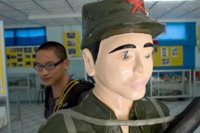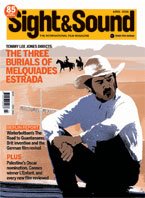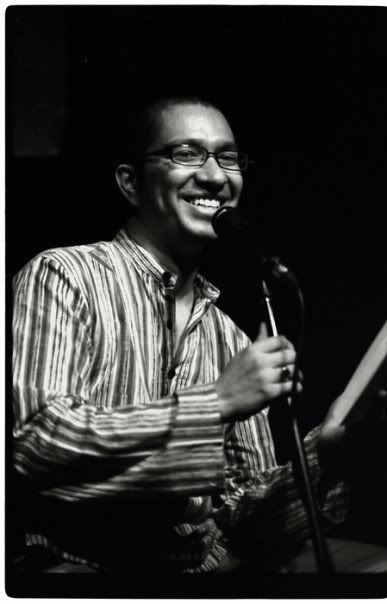 Seeing redBy Kong RithdeeThe Bangkok Post.
Seeing redBy Kong RithdeeThe Bangkok Post. 21 April.
Partly shot in Betong, Yala province, Amir Muhammad's latest documentary is as humanly sociological as it is sharply political, and as refreshing in its historical re-examination as it is whimsical in its colours. It is as much a loose-limbed travelogue as it is a tight-assed historiography. It plays for and against leftists and rightists, royalists and jacobins, communists and capitalists, pro-and anti-colonialists. It dallies with controversies, indulges in good-humoured diversions, yet manages to maintain the heft worthy of an academic discussion.
And the most unexpected thing: this Malaysian documentary with a contentious title,
The Last Communist, has passed the censor's board and will open in three Kuala Lumpur theatres in May.
"I submitted the film to the censor just for the fun of it," Amir told us when we caught up with him at
Hong Kong International Film Festival last week. "I didn't expect it, but they let it pass and we're now releasing it. It's a big surprise."
A pleasant surprise, that is, given the conservative rigour the Malaysian board is known for. Bangkok cinephiles should keep their fingers-crossed since local film-fest organisers (smaller ones, not the government-backed one) have expressed strong interest in bringing
The Last Communist across the border, not simply because the doc features a section that concerns Thailand's South, but mainly because Amir's work observes the virtues of film as a political gesture - something that's sorely lacking among Thai filmmakers despite the stinking swamp of politics into which we've now sunk.
Simply put,
The Last Communist (Lelaki Komunis Terakhir) is a loose biography of Chen Peng, former leader of Malaysia's Communist Party in the 1950s who later fled, along with his comrades, to Betong, the southernmost district of Thailand, after the government's crackdown (it's believed that Chen Peng is now living in Bangkok). But Amir's essayistic approach is less concerned with detailing the episodes in Chen Peng's life than with using this last communist's journey as a springboard to look at the post-war social history of the country. Crisscrossing Malaysia's backwaters and talking to dozens of ordinary folks - not necessarily about Chen Peng, but about their lives, their work, their well-being, their ideas of a country - Amir sketches a luminous portrait of Malaysia's political, cultural and racial identities formed after the 1957 Independence.
So we hear a Malay farm worker lament about the poor economy of her region and a Chinese merchant who gives us a tour of his charcoal factory. All this, by the way, is intercut with cheeky musical sequences scored to mock-propaganda numbers whose lyrics contrast the "official" image of Malaysia with the complex, even difficult actuality faced by the inhabitants of the peninsula.
"If there's a word that describes this movie, it's 'landscape'," says Amir, a 34-year-old law graduate who's pioneered digital filmmaking in Malaysia since the late 1990s. "But I'm not just talking about a geographical landscape, but a historical one, too. In making
The Last Communist, I was just curious about what this landscape called Malaysia actually is."
No easy answer emerges from the movie, but that's a trifling matter since the point of good documentaries is all about asking questions. Amir, a Malaysian of Indian descent, faced tough ethnic questions himself when doubts were raised as to why a non-Chinese would want to discuss the life of a Chinese communist. Like everywhere else, politics is racial in Malaysia: the pre-war communist movement in Malaya was strictly a Chinese activity, as the Chinese migrant workers identified themselves with "their people" in China rather than the Malay majority, especially more so since Japan began their notorious invasion of the Mainland.
"My previous film [
The Year of Living Vicariously] dealt with political dissensions in Indonesia, and that inspired me to do something about Malaysian politics," says Amir. "And it happened that Chen Peng has just published a book about his life, called
My Side of History, which became like a basis that I developed into the movie.
"Since no Chinese filmmaker is interested in the subject, there should be nothing wrong with me wanting to do it. I believe that there are two types of films we should make: films about things that we know about, and films about things that we don't know. With
The Last Communist, I had to do a lot of research and travelling; as a Malaysian, there are still many things about Malaysia - so many places and peoples - that I'm not familiar with, and this film gave me the opportunity to get to know more about my own country."
In a section that shows how a national history can slip across physical borders, Amir's doc visits a village in Betong where Chin Peng and his members from the Communist Party of Malaya retreated to in the 1960s. There we meet a group of elders - they don't exactly identify themselves with Malaysia, but they aren't entirely Thai either - who speak eloquently about their present existence and past ideologies. They talk about their sporadic attacks along the borders in the old days and their choices of either going "home" or staying here after they were granted asylum by the Thai authorities.
But above all, Amir believes, what these ex-communists want to say is that they have their place firmly fixed in the history of Malaya, of its struggle for independence. "They want us to know," adds Amir, "that nobody can take that away from them."
As our own southern discomfort grows, Malaysia is sometimes cited as a model on how a sharply multi-ethnic country can maintain its social harmony. But in a way,
The Last Communist shows us that harmony might only be a national myth that needs plenty of hard work to nurture, and that Malaysia's quest to find its real identity still goes on half a century after colonial rule.
"In Malaysia, we've racialised the way we think - we make bread this way because the Malay like it, or we make it the other way because the Chinese like it. When times are good, people don't ask questions, but when times are tough, when there aren't enough jobs, then what we think didn't matter starts to matter, like why the Chinese control most of the economy, or why the Malays enjoy more privileges from the government.
"Malaysian people have a short-term memory," he continues. "We can't remember things that happened many decades ago. So if certain things are repeated frequently enough, they will become true in the people's minds - like we can repeat to ourselves that we're living in perfect harmony, or the other way round. Some Malay schools may repeat to their students that they need to work hard if they don't want the Chinese to take over the country. But of course there is tension, like everywhere else.
"In fact, Thailand is different, at least you speak the same language, right?"
Yes we do, though perhaps we, too, need a constant reminder. And it would be nice if we had a few filmmakers with the political consciousness, the will to express their view on the state of nation, like those in our southern neighbour do.











